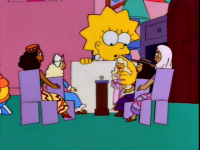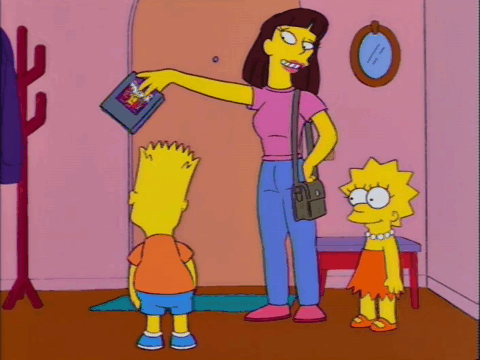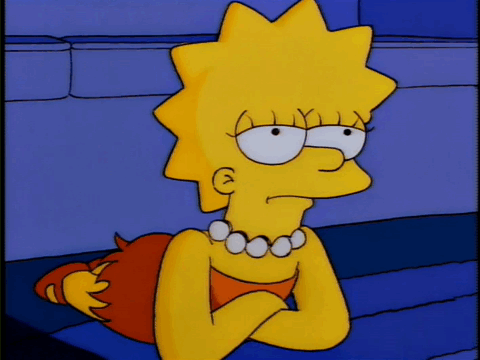Shifting back to the subject of Marge, but it genuinely baffles me that the writers never actually tried to develop the relationship between her and Helen.

Helen was introduced first in
Life on the Fast Lane, Marge's very first proper story, when she happens upon Marge and Jacques together, and the episode pretty clearly establishes her deal despite it being her only one scene. She introduces herself in a way
that indicates she's trying to get Marge to know who she is (when Marge's response indicates she already knows), and from there pesters the two in a way
specifically to try and suss out if Marge is having an affair, all just so she can spread the word around later. This communicates a lot in very little - while Marge is definitely in the wrong for her budding affair with Jacques, Helen is clearly doing this out of a desire to just get a moral "victory" over her. That she specifically calls out Marge by name also directly infers that this isn't a first meeting, and the two women have a history which is also
probably not a pleasant one.
The thing is too that they don't ever really forget about this, either. In
Marge vs Itchy and Scratchy,
Helen is the one who drags the protest against cartoon violence into full-on censorship. In
A Streetcar Called Marge,
she's the one playing the role of Stella, Blanche's direct opposite. In
Marge In Chains,
she testifies against Marge and spreads nasty rumors about her. In
The Twisted World of Marge Simpson, Helen is largely the one treated as the face of the Investorettes,
being the one to push for kicking Marge out and getting the most dialogue. The pattern is very consistent across the entire classic series, it isn't like the Twins or Janey, where the creators initially intended a dynamic only to drop it once it stopped really working with how they'd developed the characters, it's something that we're reminded of in half of Marge's actual stories.
And yet it's also something never really
used, either. All these examples I named are just fleeting scenes, nothing actually designed to give definition. Even in
In Marge We Trust, the story about Marge working at the church, Helen has a grand total of
one scene where she calls Marge to express her concerns about her husband, the story despite being about Lovejoy just completely ignoring Marge's pre-established relationship with his wife. Helen is effectively treated as a nobody, just another character the animators insert into crowd scenes, rather than someone whom the audience is in any way supposed to care about. In spite of how many times the show seems to be leaning on Helen as some kind of foil to Marge, they never once commit to it, and just kinda shove the point to the side as an irrelevant point of reference.

What makes this strange is that, from what I understand, the general lack of focus on Marge was in large part because of the writers struggling to think of story concepts for her....yet the relationship she has with a character clearly intended as her foil just wasn't ever iterated upon. Helen is unique in that, unlike the other non-Simpson women of Springfield sans Edna, she
isn't introduced as a derivative. She isn't "Ned Flanders' wife" or "Milhouse's mother", she's "Helen Lovejoy, the gossipy wife of the minister". She's framed as an actual full character, with a unique design, full name (Luanne was just "Mrs van Houten" until Season 8), and a personality which isn't just a genderswap of her husband. And the church is something Marge only has a connection to; Bart and Homer don't even want to go, while Marge is shown to be very openly devote. And very directly associated with the church is a woman who the show seems to present as Marge's natural rival in a way not dissimilar to Homer and Ned; the "honorable" wife of the local reverend who is in reality a vindictive, judgemental, moralizing gossip. Seems pretty much exactly the sort of woman you'd pair up in a contrast to Marge, whose main character traits are in being the "average" mother and wife to a dysfunctional family unit, while expressing a much stronger moral and emotional core beneath the surface.
Indeed, Jessica's existence only
strengthens the dichotomy; Marge and Bart's relationship is defined by how much genuine faith Marge has in her son in spite of fully acknowledging his terrible behaviour, so how would that contrast with Helen, whom
Bart's Girlfriend strongly implies also fuels her daughter's issues through intense moralism and denial of her actual emotional needs? That's if anything a very obvious angle to take, and yet it's a story we simply don't have. We don't have the story examining Marge's contrasting conflict with another wife and mother, even when the set-up and foundation is entirely there (before you bring up
Clash of the Cave Moms, that story is way more about Marge being overzealous than it is her relationship with Luanne). Instead, we just have the lip-service references to Marge being in antagonistic feuds with seemingly half the women in town...while also inexplainably hanging out with them on the regular too. Even women who have just flat-out attempted to kill her and/or her family get to just chill with Marge, in fact.
This is a really persistent issue with Classic Simpsons that I see reflected in the use of Marge especially. The show has a
lot of narrative gaps regarding its initial foundation and worldbuilding, which is understandable for a starting point (especially given how generally rough S1 is), but even when presented with clear solutions, actual narrative concepts that can allow them to expand the series and tell more stories, they just don't use them. Marge can be given a passion and genuine for art (
Brush with Greatness), and a meaningful friendship with her neighbor (
Marge on the Lam), but these premises are used as just one-off concepts, to be discarded with once the episode is finished, rather than be allowed to settle and influence the creative direction moving forward. Sure, this might be the "typical" sitcom formula, but that doesn't mean it's
good, or enable the infinite storytelling glitch the creators seemed to think it gave them (if it had, we wouldn't have had the comments about Oakley/Weinstein struggling for new story concepts). It's a kind of creative thinking which feels like...stubborness, I guess? And it's specifically really puzzling that, from practically Day 1, the show had a clear solution to the issue of Marge having little to really
do for the most part, and didn't just not take it, but seemed to actively just ignore it even though they clearly remembered it existed.
Just odd overall.












